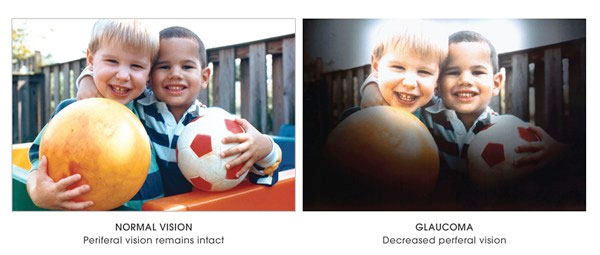
Glaucoma
Glaucoma is an eye disease in which the internal pressure of your eye rises to a point that the optic nerve is damaged. As the fibres that make up the optic nerve are damaged, the amount and quality of information sent to the brain decreases and a loss of vision occurs.
If diagnosed at an early stage, glaucoma can be controlled and little or no further vision loss should occur.

If left untreated, peripheral vision and eventually central vision will be destroyed and almost complete.
Who gets glaucoma?
Anyone can get glaucoma, but it is most frequently occurs in individuals over the age of 40. For some families, there is a hereditary tendency for the development of the disease. There is a greater risk of developing glaucoma if you have diabetes, high blood pressure, cardiovascular disease or a history of eye injuries. Regular comprehensive eye examinations are important for people of all ages to assess the presence of, or your risk for, developing glaucoma. Most types of glaucoma have no symptoms in the early stages and can only be detected through an eye exam.
How is glaucoma detected?
The most common type of glaucoma is primary open-angle glaucoma. It develops painlessly and gradually and there are no early warning signs.
In other cases, glaucoma may appear suddenly and present warning signs and symptoms such as nausea, eye pain, red eyes, blurred vision and haloes around lights. This is called acute angle-closure glaucoma.
A comprehensive eye examination is the only way to detect glaucoma. Dr Dubé, optometrist will measure the internal pressure of the eye, look into your eye to observe the health of the optic nerve, and may also assess your field of vision and measure the health of the fibres that make up the optic nerve.
How is glaucoma treated?
Treatment with daily eye drops and/or laser surgery is usually effective at maintaining your vision, but once vision is lost due to glaucoma, it cannot be restored. Regular comprehensive eye examinations with your optometrist are highly recommended to screen for and prevent glaucoma.

Comments closed
No comments. Leave first!